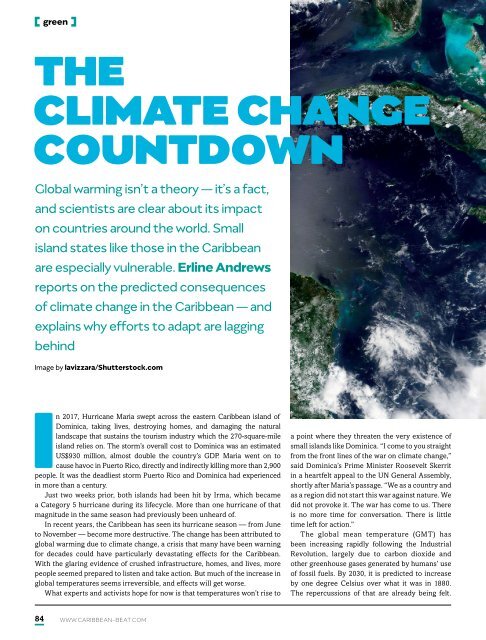Caribbean Beat — September/October 2019 (#159)
A calendar of events; music, film, and book reviews; travel features; people profiles, and much more.
A calendar of events; music, film, and book reviews; travel features; people profiles, and much more.
Create successful ePaper yourself
Turn your PDF publications into a flip-book with our unique Google optimized e-Paper software.
green<br />
The<br />
climate change<br />
countdown<br />
Global warming isn’t a theory <strong>—</strong> it’s a fact,<br />
and scientists are clear about its impact<br />
on countries around the world. Small<br />
island states like those in the <strong>Caribbean</strong><br />
are especially vulnerable. Erline Andrews<br />
reports on the predicted consequences<br />
of climate change in the <strong>Caribbean</strong> <strong>—</strong> and<br />
explains why efforts to adapt are lagging<br />
behind<br />
Image by lavizzara/Shutterstock.com<br />
In 2017, Hurricane Maria swept across the eastern <strong>Caribbean</strong> island of<br />
Dominica, taking lives, destroying homes, and damaging the natural<br />
landscape that sustains the tourism industry which the 270-square-mile<br />
island relies on. The storm’s overall cost to Dominica was an estimated<br />
US$930 million, almost double the country’s GDP. Maria went on to<br />
cause havoc in Puerto Rico, directly and indirectly killing more than 2,900<br />
people. It was the deadliest storm Puerto Rico and Dominica had experienced<br />
in more than a century.<br />
Just two weeks prior, both islands had been hit by Irma, which became<br />
a Category 5 hurricane during its lifecycle. More than one hurricane of that<br />
magnitude in the same season had previously been unheard of.<br />
In recent years, the <strong>Caribbean</strong> has seen its hurricane season <strong>—</strong> from June<br />
to November <strong>—</strong> become more destructive. The change has been attributed to<br />
global warming due to climate change, a crisis that many have been warning<br />
for decades could have particularly devastating effects for the <strong>Caribbean</strong>.<br />
With the glaring evidence of crushed infrastructure, homes, and lives, more<br />
people seemed prepared to listen and take action. But much of the increase in<br />
global temperatures seems irreversible, and effects will get worse.<br />
What experts and activists hope for now is that temperatures won’t rise to<br />
a point where they threaten the very existence of<br />
small islands like Dominica. “I come to you straight<br />
from the front lines of the war on climate change,”<br />
said Dominica’s Prime Minister Roosevelt Skerrit<br />
in a heartfelt appeal to the UN General Assembly,<br />
shortly after Maria’s passage. “We as a country and<br />
as a region did not start this war against nature. We<br />
did not provoke it. The war has come to us. There<br />
is no more time for conversation. There is little<br />
time left for action.”<br />
The global mean temperature (GMT) has<br />
been increasing rapidly following the Industrial<br />
Revolution, largely due to carbon dioxide and<br />
other greenhouse gases generated by humans’ use<br />
of fossil fuels. By 2030, it is predicted to increase<br />
by one degree Celsius over what it was in 1880.<br />
The repercussions of that are already being felt.<br />
84 WWW.CARIBBEAN-BEAT.COM

















